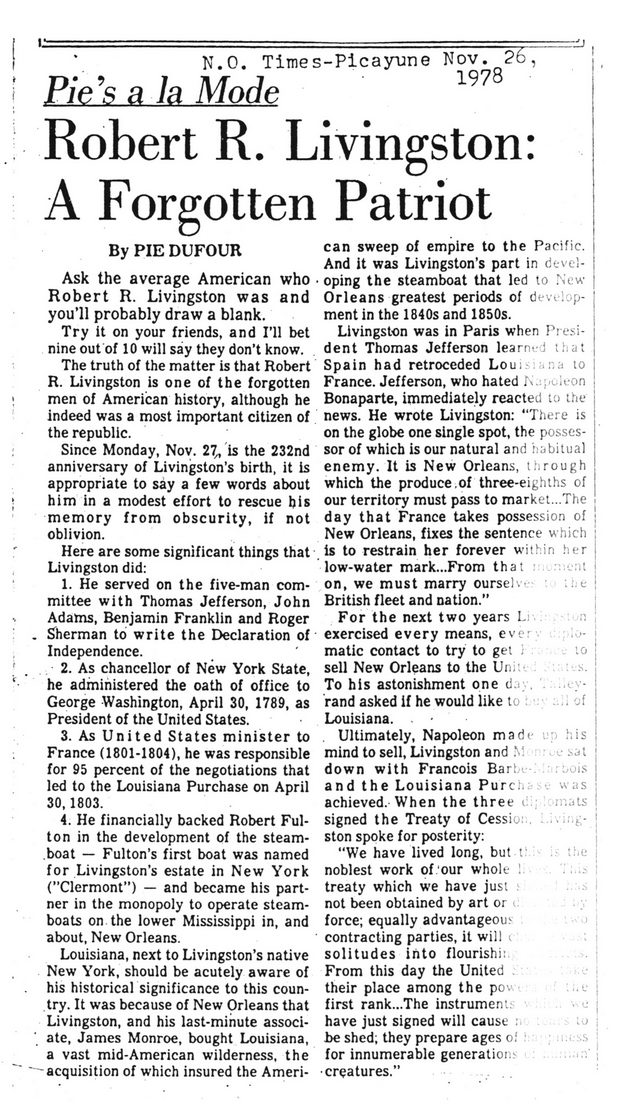This text was obtained via automated optical character recognition.
It has not been edited and may therefore contain several errors.
N.O. Times-Picajrune Nov. 26,
Pie’s a fa Mode 1973
Robert R. Livingston:
A Forgotten
By PIE DUFOUR Ask the average American who • Robert R. Livingston was and you’ll probably draw a blank.
Try it on your friends, and I’ll bet nine out of 10 will say they don’t know.
The truth of the matter is that Robert R. Livingston is one of the forgotten men of American history, although he indeed was a most important citizen of the republic.
Since Monday, Nov. 27„ is the 232nd anniversary of Livingston’s birth, it is appropriate to say a few words about him in a modest effort to rescue bis memory from obscurity, if not oblivion.
Here are some significant things that . Livingston did:
1. He served on the five-man committee with Thomas Jefferson, John Adams, Benjamin Franklin and Roger
. Sherman to write the Declaration of Independence.
2. As chancellor of New York State, he administered the oath of office to George Washington, April 30, 1789, as President of the United States.
3. As United States minister to France (1801-1804), he was responsible for 95 percent of the negotiations that led to the Louisiana Purchase on April 30,1803.
4. He financially backed Robert Fulton in the development of the steamboat — Fulton’s first boat was named for Livingston’s estate in New York ("Clermont”) — and became his partner in the monopoly to operate steamboats on the lower Mississippi in, and about, New Orleans.
Louisiana, next to Livingston’s native New York, should be acutely aware of his historical significance to this country. It was because of New Orleans that Livingston, and his last-minute associate, James Monroe, bought Louisiana, a vast mid-American wilderness, the acquisition of which insured the Ameri-
Patriot
can sweep of empire to the Pacific. And it was Livingston’s part in developing the steamboat that led to New Orleans greatest periods of development in the 1840s and 1850s.
Livingston was in Paris when President Thomas Jefferson learned that Spain had retroceded Louisiana to France. Jefferson, who hated K^.oieon Bonaparte, immediately reacted to the news. He wrote Livingston: "There is on the globe one single spot, the possessor of which is our natural and habitual enemy. It is New Orleans, through which the produce.of three-eighths of our territory must pass to market...The day that France takes possession of New Orleans, fixes the sentence which : is to restrain her forever within her j low-water mark...From that ; . ;. .;it
on, we must marry ourselv i.e
British fleet and nation.”
For the next two years I.: .-..n
exercised every means, ever \o-
matic contact to try to get }■ to
sell New Orleans to the Uni'.: s.
To his astonishment one d.v , . y-
rand asked if he would like to : '.'.of
Louisiana.
Ultimately, Napoleon made up his mind to sell, Livingston and M - sat down with Francois BarU- L,ois
and the Louisiana Purchi. ■. was
achieved. When the three : mats
signed the Treaty of Cessio: , ston spoke for posterity:
“We have lived long, but t‘ the
noblest work of our whole !. .i
treaty which we have just si
not been obtained by art or i. :.-y j
force; equally advantageous j
contracting parties, it will i . i
solitudes into flourishi: j
From this day the United .-.e j
their place among the pow :;.e j
first rank...The instrument: . j j
have just signed will cause ; to j
be shed; they prepare ages of 1 ss j
for innumerable generation.^ : n' ; •creatures.”

Explorers Robert-R.-Livingston